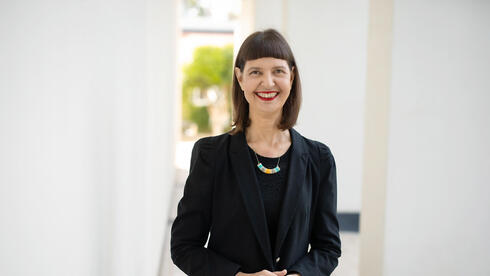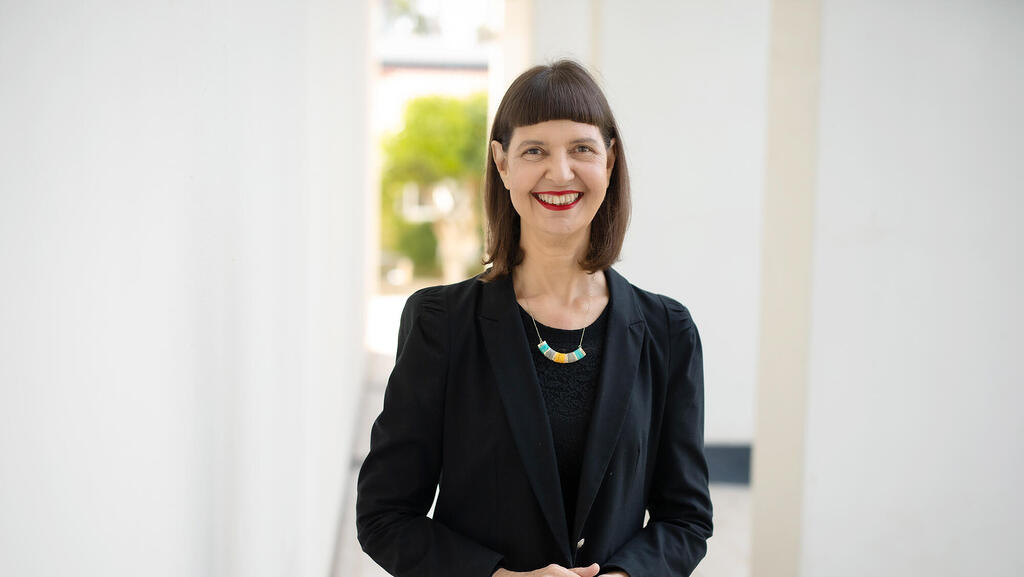
ISRAEL AT WAR
"The entrepreneurial community in Israel rallies in times of crisis and really gives their best to each other"
Prof. Dafna Kariv from Reichman University studied the effects of crises on young entrepreneurs and found that there are unique characteristics of entrepreneurs in Israel that allow local high-tech to grow time and time again
At the time of the Coronavirus outbreak, when businesses reduced or closed their activities and were working from home, Prof. Dafna Kariv of the Adelson School of Entrepreneurship at Reichman University, began to hear from friends, owners of technological ventures in Israel, that not only were they working at their peak, but they were also achieving much more. All this happened while the whole world, including their competitors, were at home. This was the trigger for her to start researching Israeli entrepreneurship in crisis. "I like to catch crises when they happen and investigate them in real time. This is always better than asking retroactively, 'How did you feel when the crisis broke out?'. The answers during a crisis are the most authentic," she says.
She started interviewing entrepreneurs during the pandemic, which led to a book she wrote called "Startups and Crisis Management" which was published by Routledge. In addition, she has published several studies on topics such as stress of technology entrepreneurs during a crisis, their psychological capital, belonging to a community and measures of success.
Now, with the outbreak of the war, Kariv returned to some of the entrepreneurs she interviewed then, during the pandemic, to check how the war affects young entrepreneurs. She discovered in her research, and confirms this even now, that in crisis situations the managerial ability among young entrepreneurs increases because of unique qualities of entrepreneurs and, in particular, of entrepreneurs in Israel.
What, according to the studies you conducted, makes the entrepreneurs in Israel unique in dealing with crises?
"We found two findings that are very unique to Israeli entrepreneurs and one that is more general. The first interesting thing is that we checked the stress levels of the entrepreneurs and found that they are super high, at a level where you want to call a cardiologist because they are about to die. They face very heavy pressures both operationally and in terms of the staff and also financially. But at the same time, we discovered that within this Israeli entrepreneurs have very high levels of hope and optimism. So high, in fact, that I went to check the levels of hope again because I thought there was a mistake, that maybe they didn't understand the question. They say, 'My situation is difficult, I am very worried - but it will be fine.'
“We tested it all with AI to see the sentiments. We found that among the Israelis the stress levels are very high but the sentiment is positive - they say I am terribly stressed but I will overcome it.
“The second thing we found is that there is some element of communalism that, for the Israelis, it turns out, is the 'game changer'. Those who feel that they are part of a community, which can be a WhatsApp community or a professional community or any other community - have a very high crisis management ability. They say, whatever happens there are people around me. They are very stressed. There is a drop in income, many of the investors have withdrawn their offers at the moment so there are problematic economic effects but the sentiment is positive - they will improve. Belonging to a community is very strong and influential in other aspects. For example, those who feel part of a community are more proactive: they turn to investors, they know that high-tech will continue and turn to the whole world, to everyone possible, to continue their businesses. We see that it is real, that they really behave in such a way that even if they crash they will get back up, because the main thing is that they are part of something bigger and that they are 'connected' with their 'brothers'. In his time, Freud said that what keeps people going through a crisis is love and work, it's a bit similar to what's happening now. The entrepreneurs suffered a blow on October 8 (the day after the Hamas attack) but starting the very next day on October 9 they began working even though they continue to cry for the kidnapped and the soldiers - but they continue to work.
"Israeli entrepreneurs have two strengths: the community, the "togetherness" that does not exist in most countries of the world, and secondly the hope in terms of 'it will be fine' even when nothing is fine. And the entrepreneurs believe in it and it is their stimulator."
You talked about two unique findings and one general one - what is the general thing you found that is not unique to Israelis but helps entrepreneurs in times of crisis?
"The general thing is that the psychological capital of entrepreneurs is inexplicably higher. In contrast to people who are not entrepreneurs, whose levels of resilience, or happiness, rise and fall depending on the situation - with entrepreneurs, the levels of resilience of course also decrease, but not in a proportional way to what happens to people who are not entrepreneurs. In general, entrepreneurs have higher levels of resilience. We don't know which is the egg and what is the chicken - is that why they chose entrepreneurship or did entrepreneurship make them this way, but entrepreneurs have higher levels of resilience even in crisis situations."
Resilience, Kariv explains, is one of four parameters that make up 'psychological capital'. The other three are self-management, optimism and hope.
The 'secret weapon', which in Kariv's opinion is the key that allows Israeli entrepreneurs to grow from crises, is, as mentioned, community. More precisely, the feeling that they are part of a community. "I didn't even check if they were really in a community, but in a series of questions I checked if they felt they were part of a community, which would help them in any situation, both on a professional level, on an organizational level, and financially. The entrepreneurial community in Israel rallies in times of crisis and really gives their best to each other. All these statements by entrepreneurs about it being a dog eat dog world of entrepreneurship, and that there is often unhealthy competition - may be true, but not during a crisis. For example, one of the entrepreneurs we talked to now, he is around 40-years-old and an entrepreneur of a well-known company, and he told me that his company is currently in the green so he dedicates part of his income to two startups in the same market that are fighting for their lives. He said that this is not an investment but a donation. Another example is of two technology startups who each have a different venture and now they have decided to do a kind of merger with another company so that the three of them together will be more successful. They compete but now they are building a new model in which each one provides a complementary service rather than a competitive service. Another entrepreneur sent presenters abroad who literally walk the streets with the Israeli flag and the company's name. You see that no one remains static. The Israeli slogan of 'together we will win' is so strong with the entrepreneurs and they just took it literally and do things together. Now, people are not suckers, they know what the profit line is and do the math to see what will happen if they merge or set aside funds for new startups. They don't do it out of a hidden interest but out of a decision that they are now supporting the community."
Do you think, in light of your research and familiarity with the area, that Israeli high-tech will survive the current crisis?
"Yes, high tech will survive this crisis. First, there is a vibe of proactive action, a desire to succeed and show that we will win. This boosts the motivation and performance of many high tech companies. In addition, some organizations manage to leverage the gaps created through the development of more services, more state-based products."
Based on her research on psychological capital and ways of dealing with a crisis, Kariv has several tips for tech entrepreneurs during the war:
1. Normalization and redefinition: Many entrepreneurs report very high stress levels in all areas of their venture, and at the same time also a feeling of apathy that is not commensurate with the intensity of the events outside. These two situations are an internal defense against the unimaginable difficulty. Our internal recognition and memorization that this is a defense normalizes the feelings, and gives them legitimacy. It even allows us to thank ourselves for such mental protection. Gratitude is known to produce resilience.
2. Activity through 'routinization', i.e. a process of returning to routine - "The return will be at a pace appropriate to the previous work habits of each entrepreneur, and will include normal steps, for example physically arriving at the workplace, making contact with partners abroad, going down to buy coffee in the cafe near the office, and more. The routine during a crisis produces a sense of inner victory, which instantly increases both optimism and resilience."
3. Pro-activity - "In contrast to the previous point, the intention here is to initiate a project that is not aimed directly at promoting the enterprise/company, but to 'do good' wherever it is. For example, an initiative to send virtual good words initiated by a technological entrepreneur, an initiative to seek donations for ceramic armor vests initiated by another technological entrepreneur. Proacavity gives a sense of meaning, a feeling of a contribution to something bigger than myself, and thus strengthens hope and optimism, which are a significant part of psychological capital."
4. To create belonging to the community - "This is a critical element. The message 'Together we will win' that is now in the media and discourse touches exactly this essence. That is: to be together, in communities, in networking. The recommendation is once or twice a week to deliberately dedicate oneself to belonging to the community. It is important that there is a community that has a nucleus of permanent people or alternatively its idea is permanent. It is better to meet on Zoom or physically, that is, not only to be active in the forums (in which the communication is in virtual writing). My studies indicate that this is the strongest power booster that we Israelis have. It raises all the elements of psychological capital and is significantly related to the creation of partnerships, connections with the ecosystem and entrepreneurial success even in times of crisis."
5. Observe adapted steps - personal pace - "Entrepreneurs act fast-immediately and are guided by a long-term vision. This is part of their DNA. In the current unfathomable situation it is actually better to adopt a different rhythm, of smaller steps that have results which are immediate, both small and large. Physically going to work, initiating a Zoom meeting with someone abroad, a team conversation, are examples of concrete activity, easy to achieve and yet of great significance for strengthening resilience and a sense of self-sufficiency. You can also slowly increase the pace, depending on the feeling."















